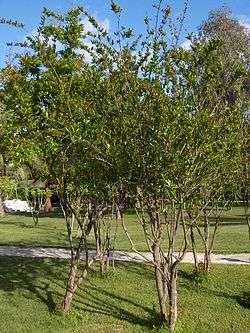Definify.com
Definition 2026
石榴
石榴
Chinese
| rock; stone; 10 pecks | pomegranate | ||
|---|---|---|---|
|
simp. and trad. (石榴) |
石 | 榴 | |
| alt. forms | 石留 | ||
Noun
石榴
Derived terms
Japanese

Alternative forms
Etymology 1
| Kanji in this term | |
|---|---|
| 石 | 榴 |
|
じゃく > ざく Grade: 1 |
る > ろ Hyōgaiji |
| Irregular | |
From Middle Chinese 石榴 (/d͡ʑiᴇk̚ lɨu/, literally “stone + pomegranate”). Compare modern Wu reading zaq lieu, Hakka sa̍k-liù.
The reading is irregular. This may represent a shift in pronunciation from an older borrowing: compare the expected goon reading jakuru. Alternatively, this reading may reflect an ancient sound borrowing, indicating the Zagros Mountains of modern-day Iran, where the pomegranate was originally cultivated.[1]
Pronunciation
Noun
石榴 (hiragana ざくろ, katakana ザクロ, romaji zakuro)
Usage notes
As with many terms that name organisms, this term is often spelled in katakana in biological contexts, as ザクロ.
Derived terms
|
Etymology 2
| Kanji in this term | |
|---|---|
| 石 | 榴 |
|
じゃく Grade: 1 |
る > ろ Hyōgaiji |
| Irregular | |
From Middle Chinese 石榴 (/d͡ʑiᴇk̚ lɨu/, literally “stone + pomegranate”). Uses the regular goon reading of jaku for the first character, and the irregular ro reading for the second character instead of the expected goon reading of ru.
Pronunciation
- (Irregular reading)
- IPA(key): [d͡ʑa̠kɯᵝɺ̠o̞]
Noun
石榴 (hiragana じゃくろ, romaji jakuro)
- (しゃくろ', obsolete) pomegranate
Usage notes
This reading appears to be obsolete.
Etymology 3
| Kanji in this term | |
|---|---|
| 石 | 榴 |
|
せき Grade: 1 |
りゅう Hyōgaiji |
| on'yomi | |
/sekiriu/ → /sekirjuː/
From Middle Chinese 石榴 (/d͡ʑiᴇk̚ lɨu/, literally “stone + pomegranate”). Uses the regular kanon reading of both characters.
Pronunciation
Noun
石榴 (hiragana せきりゅう, romaji sekiryū, historical hiragana せきりう)
- (uncommon) pomegranate
Usage notes
The zakuro reading above is the most common reading for this term.
Derived terms
References
- ↑ 清水桂一 (Keiichi Shimizu), editor (1980) たべもの語源辞典 (Tabemono Gogen Jiten, “Etymological Dictionary of Foods”) (in Japanese), 東京堂出版 (Tōkyō-dō Shuppan, “Tokyo Hall Publishing”), ISBN 4-490-10128-7
- 1 2 2006, 大辞林 (Daijirin), Third Edition (in Japanese), Tōkyō: Sanseidō, ISBN 4-385-13905-9
- ↑ 1998, NHK日本語発音アクセント辞典 (NHK Japanese Pronunciation Accent Dictionary) (in Japanese), Tōkyō: NHK, ISBN 978-4-14-011112-3
- ↑ 1997, 新明解国語辞典 (Shin Meikai Kokugo Jiten), Fifth Edition (in Japanese), Tōkyō: Sanseidō, ISBN 4-385-13143-0
Okinawan
Etymology
Attested in the 沖縄語典 (Okinawa Goten, “Okinawan Dictionary”) as ざぐら (zagura).[1] Appears to be cognate with mainland Japanese 石榴 (zakuro); see that entry for further details.
Noun
石榴 (hiragana ざくら, romaji zakura)
References
- ↑ 1896: 沖縄語典 (Okinawa Goten, “Okinawan Dictionary”). In Japanese. http://kindai.ndl.go.jp/info:ndljp/pid/992016/43